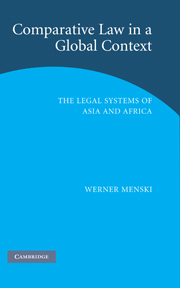Book contents
- Frontmatter
- Contents
- Preface and acknowledgments
- Table of cases
- Table of statutes
- List of abbreviations
- PART I Comparative framework
- PART II Regional comparisons in a global context
- Introduction
- 4 Hindu law: the search for appropriateness
- 5 Islamic law: God's law or men's law?
- 6 African laws: the search for law
- 7 Chinese law: code and conduct
- Conclusion: towards global legal realism
- References
- Index
4 - Hindu law: the search for appropriateness
Published online by Cambridge University Press: 09 November 2009
- Frontmatter
- Contents
- Preface and acknowledgments
- Table of cases
- Table of statutes
- List of abbreviations
- PART I Comparative framework
- PART II Regional comparisons in a global context
- Introduction
- 4 Hindu law: the search for appropriateness
- 5 Islamic law: God's law or men's law?
- 6 African laws: the search for law
- 7 Chinese law: code and conduct
- Conclusion: towards global legal realism
- References
- Index
Summary
A conceptual overview of Hindu law must of necessity proceed chronologically. One cannot understand Hindu law and the present Indian legal system while ignoring the rich tapestry of older concepts. To demystify this confusing diversity, the present chapter starts with a brief historical overview, and then examines in detail ancient pre-classical, classical and late classical, post-classical and medieval Hindu concepts of law, before moving on briefly to Anglo-Indian laws and modern Hindu laws. This analysis aims to present the totality of ‘traditional’ Hindu law as an interlinked sequence of sub-systems, emphasising the inherent dialectics and dynamisms within traditional Hindu law and its enormous scope for flexibility and internal reform.
The study of Hindu law has long been neglected due to at least four major factors. In combination, and over time, these have led to worryingly low levels of knowledge, prompting even the Indian government to reinvigorate classical learning in this field (Narang, 1988; Sivaramayya, 1988; Jois, 1990). The first major factor responsible for insufficient depth in Hindu law research is declining knowledge in its classical, Sanskrit-based foundations, which has led to a vicious circle of suffocating scholarship. Today there are simply not enough Sanskritists interested in legal study, while ‘lawyers with Sanskrit’ have long been extremely rare. Recent efforts in this field reflect the urgent need for better understanding, or one simply reprints older work (Nanda and Sinha, 1996).
Secondly, lack of professional interest has taken away a major motivation for studying Hindu law.
- Type
- Chapter
- Information
- Comparative Law in a Global ContextThe Legal Systems of Asia and Africa, pp. 196 - 278Publisher: Cambridge University PressPrint publication year: 2006

